Let us introduce you to a culinary theater of Rasmus Munk, the food alchemist
Tina Kovačićek
March 7, 2024
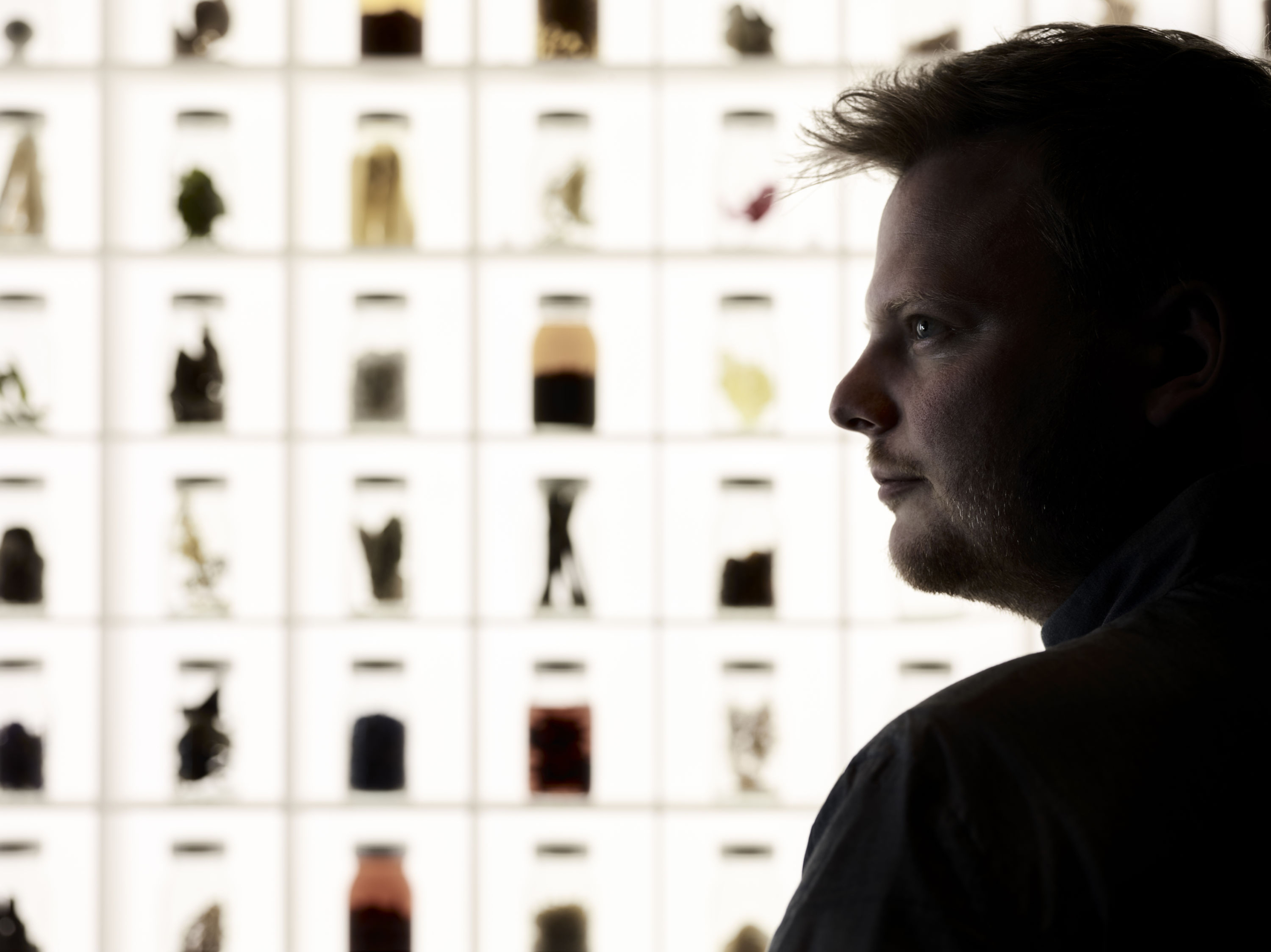
Tina Kovačićek
March 7, 2024
On a sunny day in Copenhagen, I arranged to meet with Rasmus at Alchemist. The two-ton heavy bronze doors, adorned with reliefs of Dante’s nine circles of hell crafted by Danish artist Maria Rubinke, indicated I had arrived at my destination – the renowned Danish Alchemist.
This place is not just any top-tier restaurant, as tastes and preferences are always subject to debate, but undoubtedly the most unique gastro destination in the world. Chef and co-owner Rasmus Munk, after two years of meticulous planning and developing his concept, opened the restaurant in 2019 at an old shipyard in the industrial district of Refshaleøen in Copenhagen, representing today a gastronomic revolution. Accolades seem redundant here, though they are certainly worth mentioning; shortly after its opening, Alchemist was declared the restaurant of the year by the Danes, followed by two Michelin stars within a few months, and last year, it was named the fifth best restaurant in the world and awarded the Art of Hospitality Award. All these accolades are expected for Rasmus and his brainchild, Alchemist, through which he has realized his vision of holistic cuisine, combining elements of art, theater, science, visual technology, activism, and gastronomy.
Leaving Alchemist after a six-hour dinner, you’ll be lighter by about a thousand euros per person, plus additional charges for sommelier services, wine pairing, extra drinks, but richer, in the best sense of the word, for an experience you’ll want to share with everyone. Rasmus would be pleased if he inspired you to donate organs or blood or engage in socially active activities that might make the world a slightly better place. Therein lies the point of his provocative plates.
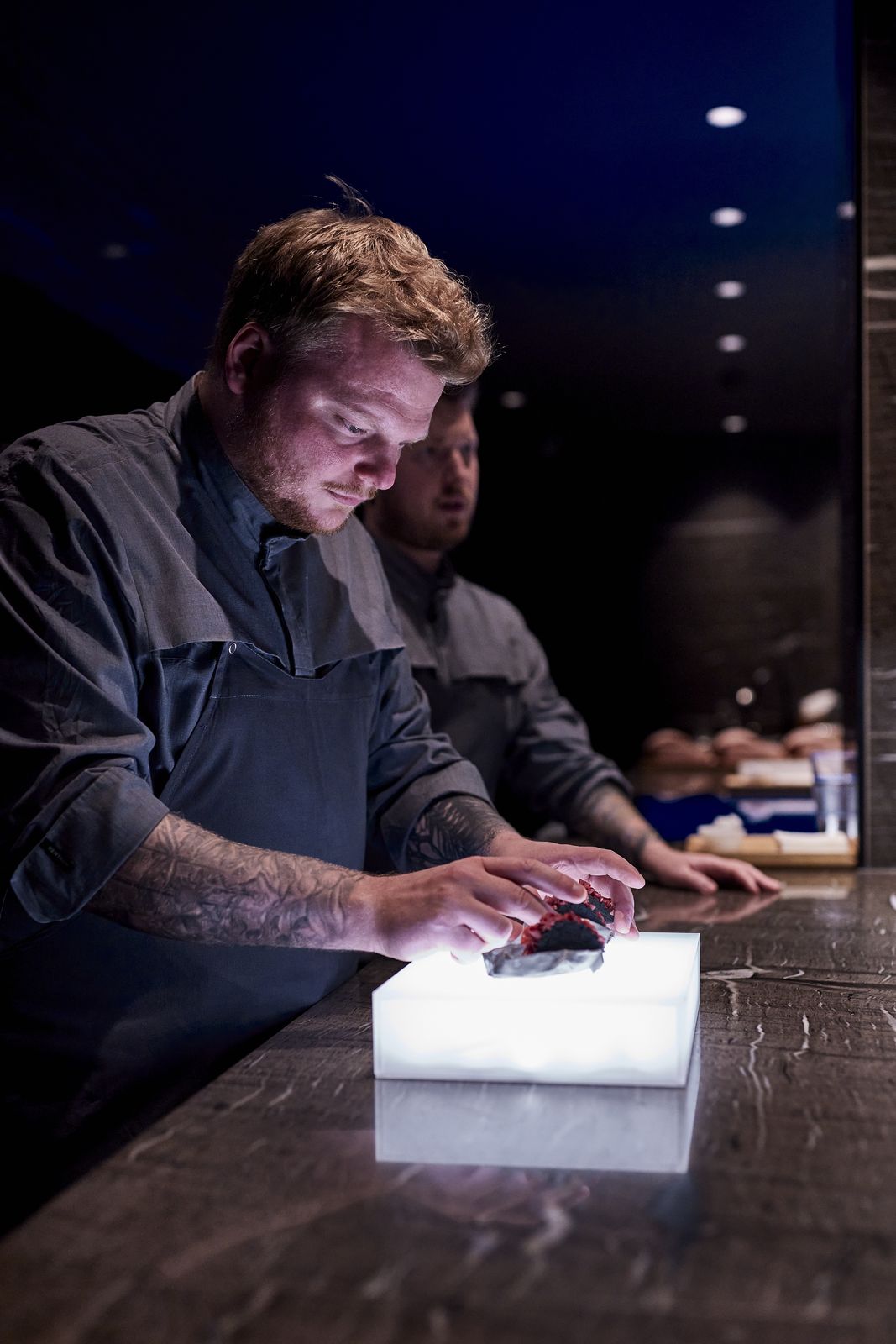
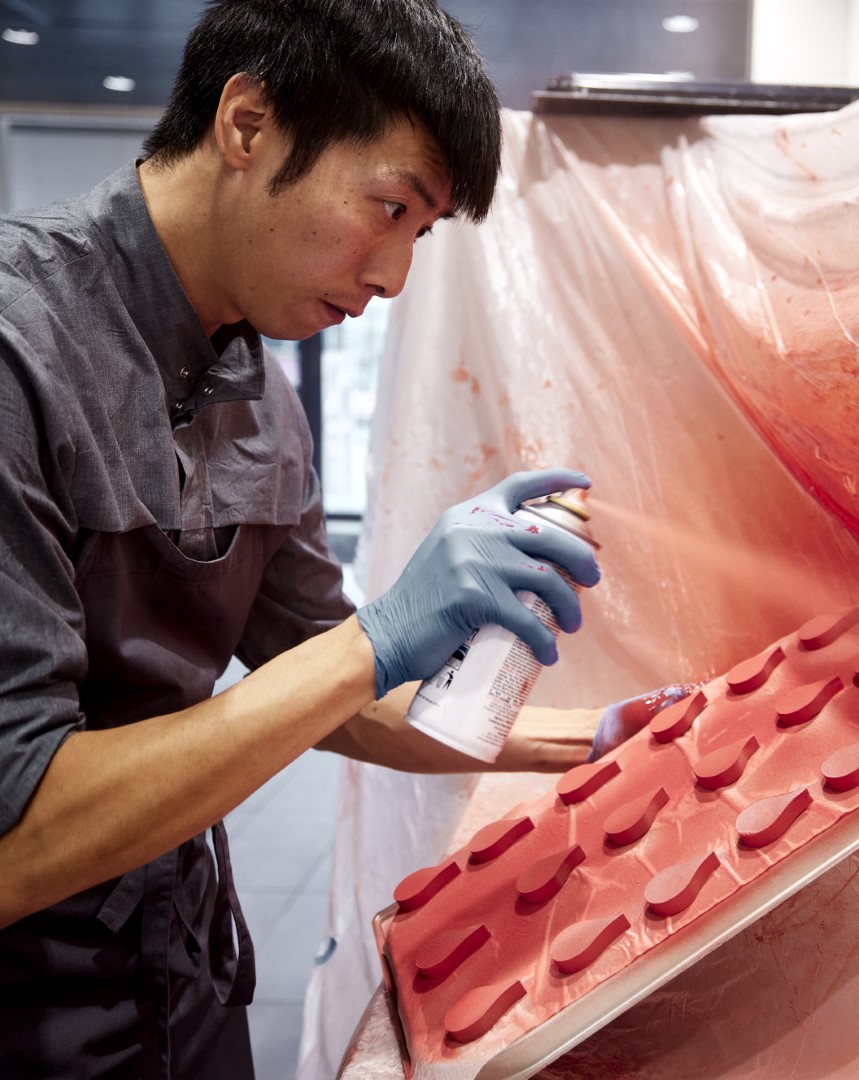
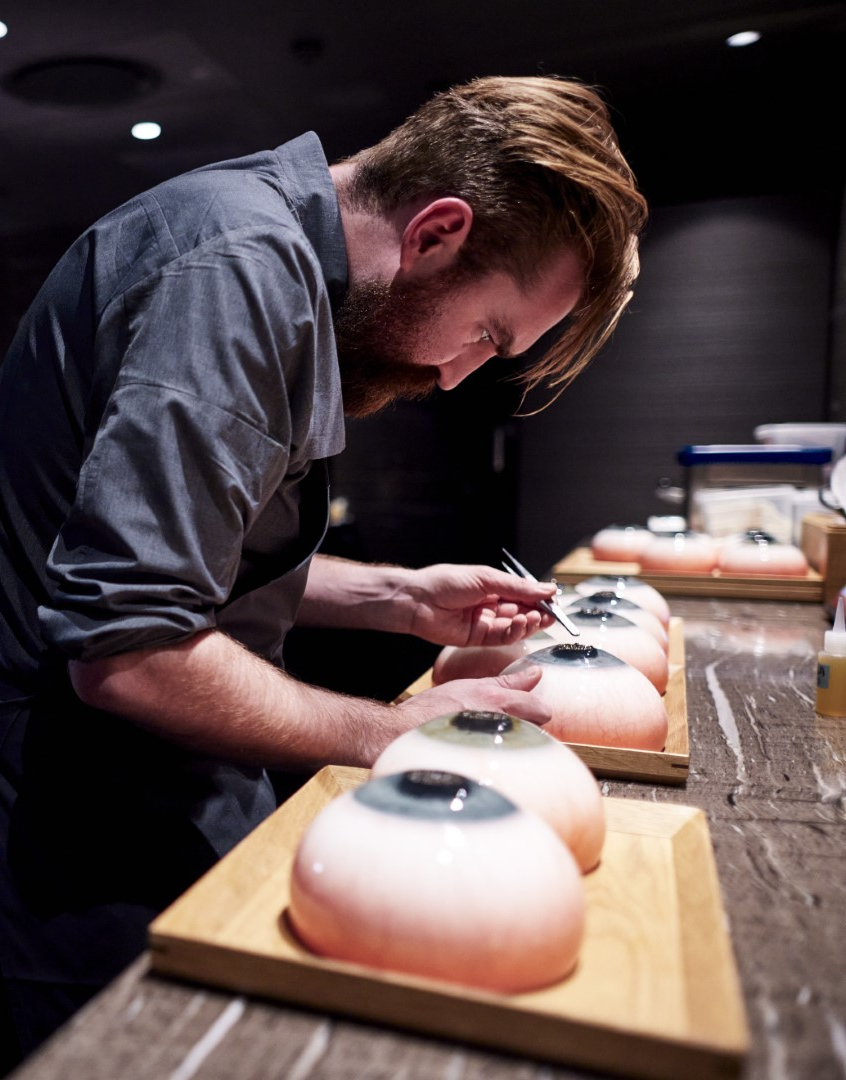
Guests are guided through a labyrinth of 50 culinary impressions, beautifully orchestrated by Chef Rasmus Munk’s vision. The whole team of collaborators and artists contributes to the visual projections, music, lighting, narrative story, scents, and architecture of the space. After passing through the gates of Dante’s hell, you enter a dark room where hosts confront you with your own identity. Then, you are directed to an anti-stress room filled with balls where you can roll around like a child. The key magic of dinner at Alchemist happens in a dome, whose ceiling serves as a projection screen, enveloping you in sounds and visuals that round off this high-end gastro journey. Understand, Alchemist will not always serve you palate- and eye-pleasing dishes, but provoking your mind and encouraging you to think is Rasmus’s ace in creating a surreal theater. He will provoke you to eat a butterfly, serve you chicken oviducts in a cage as a critique of animal breeding, disguise lamb brain in a juicy bite to see if you can think outside the box, or surprise you with a lamb heart on the plate accompanied by a bag of transfusion red liquid. His theater will force you to question your own boundaries.
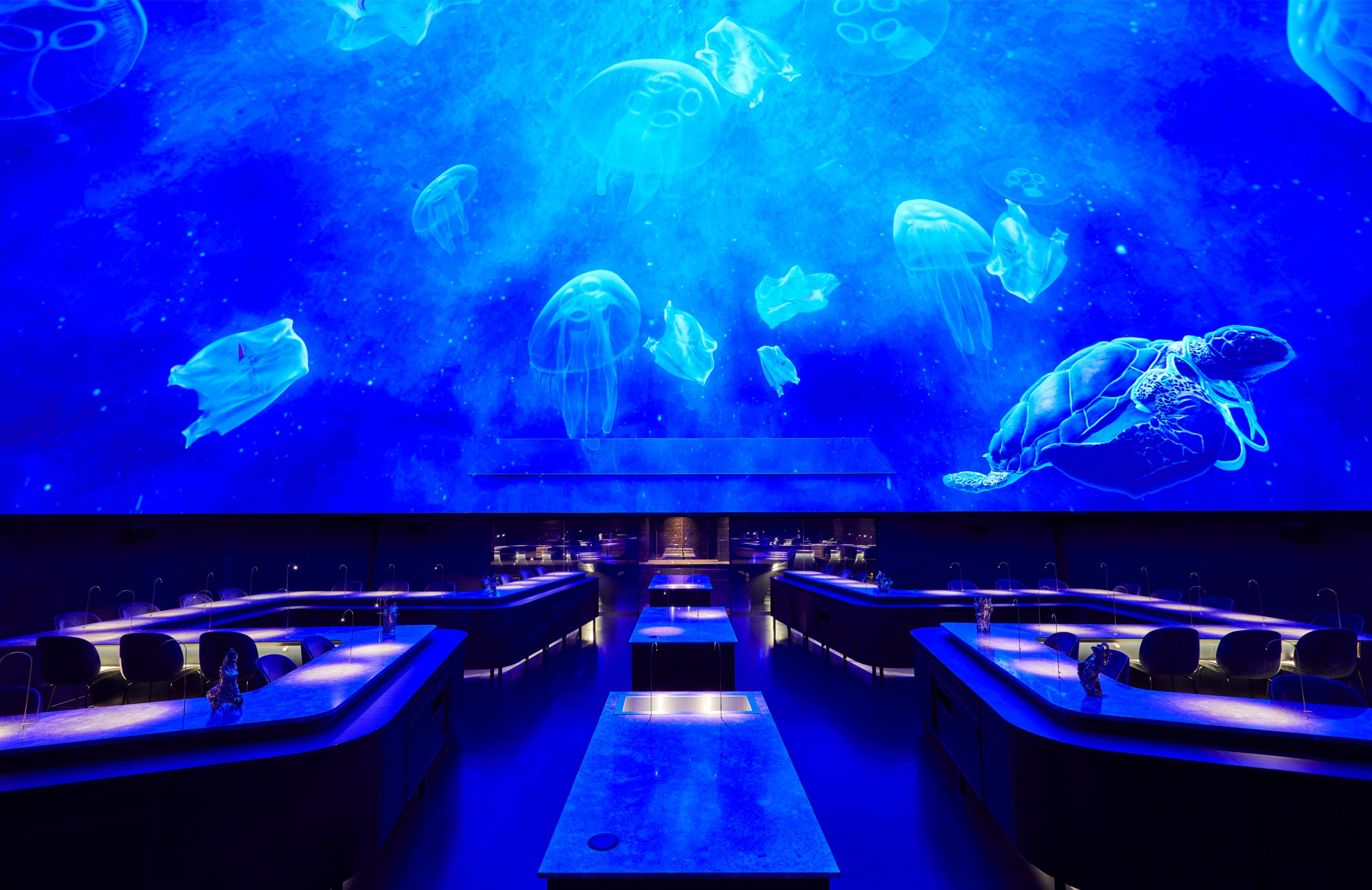
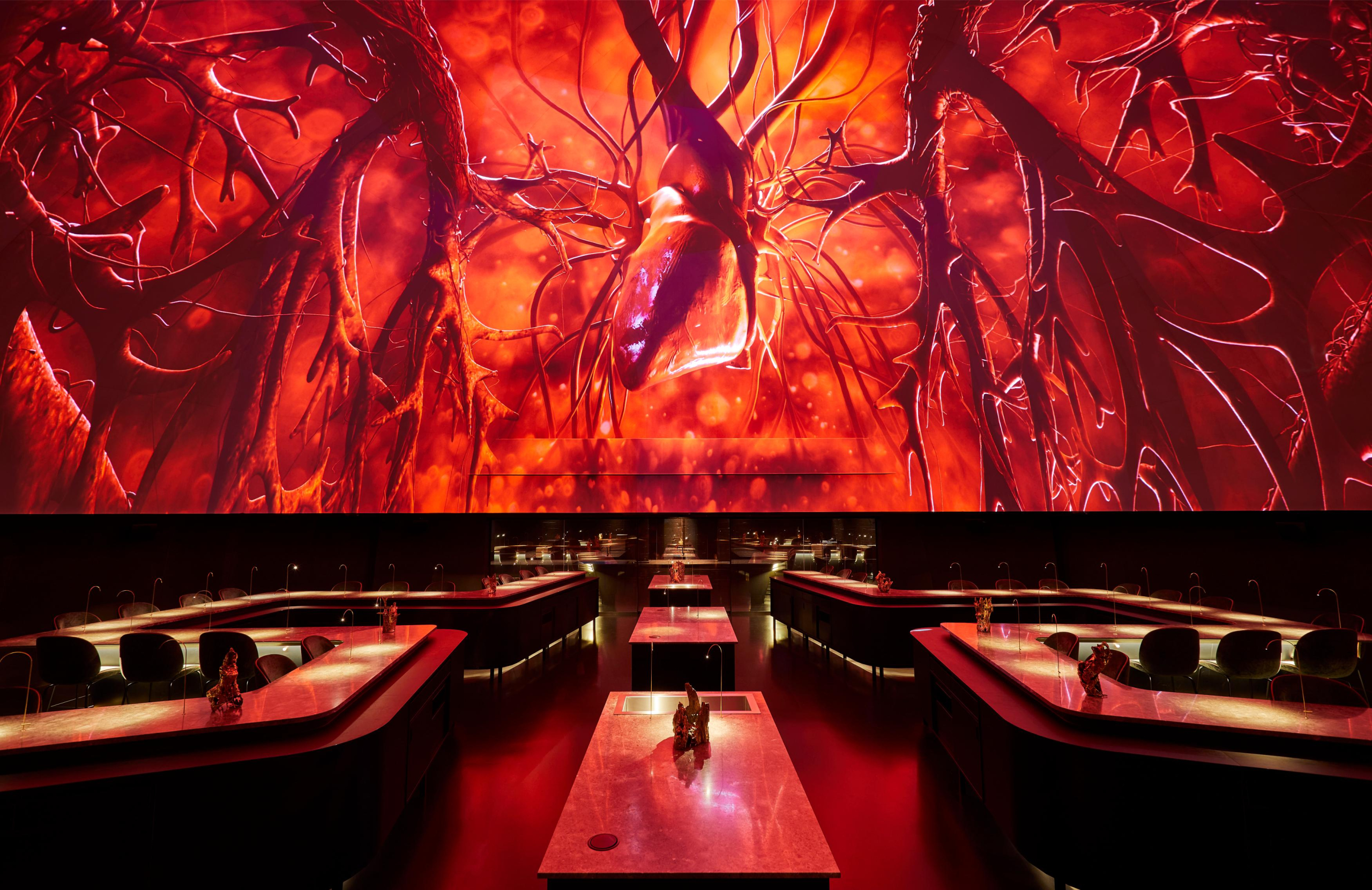
That sunny day in Copenhagen, after being led through this wonder labyrinth in the morning hours while the numerous team, mostly young employees, was preparing for the evening shift and another sold-out Friday at Alchemist, I waited for Rasmus in the luxurious lounge where the first few courses are served to guests. At that moment, your view extends through a large glass wall to the kitchen-laboratory, filled with jars used for researching and preserving ingredients for preparation, as if you were on the verge of a major discovery.
By then, I had already begun to feel a deep respect for the moment I would meet the man who, at the start of his thirties, had already reached the pinnacle of the world. Rasmus arrived, dressed in a black chef’s uniform, warm, approachable, and very down-to-earth, we might say. We quickly broke the ice with a few good jokes that we both appreciated and began an hour of very pleasant, relaxed conversation about one of the most significant restaurants of our time.
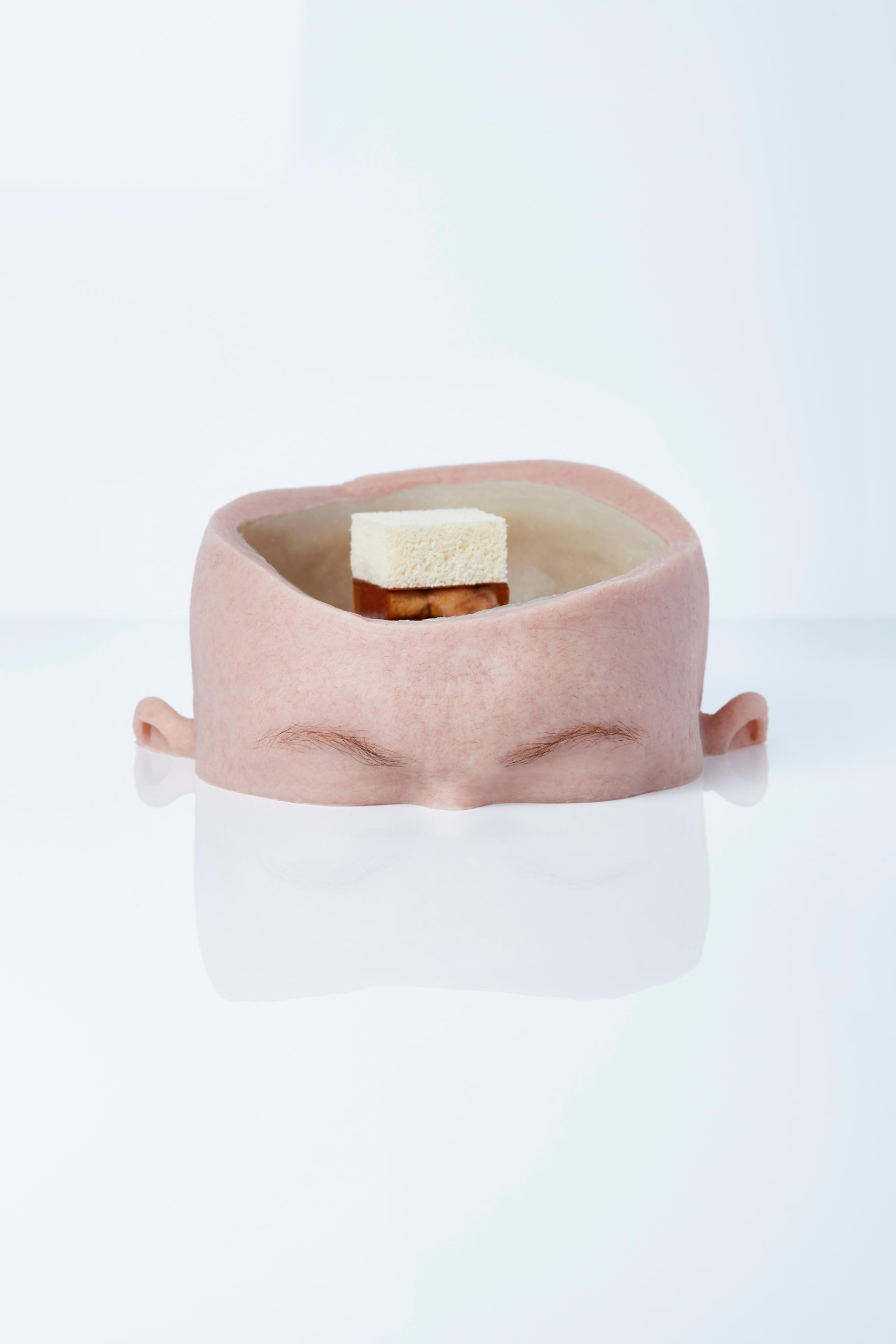
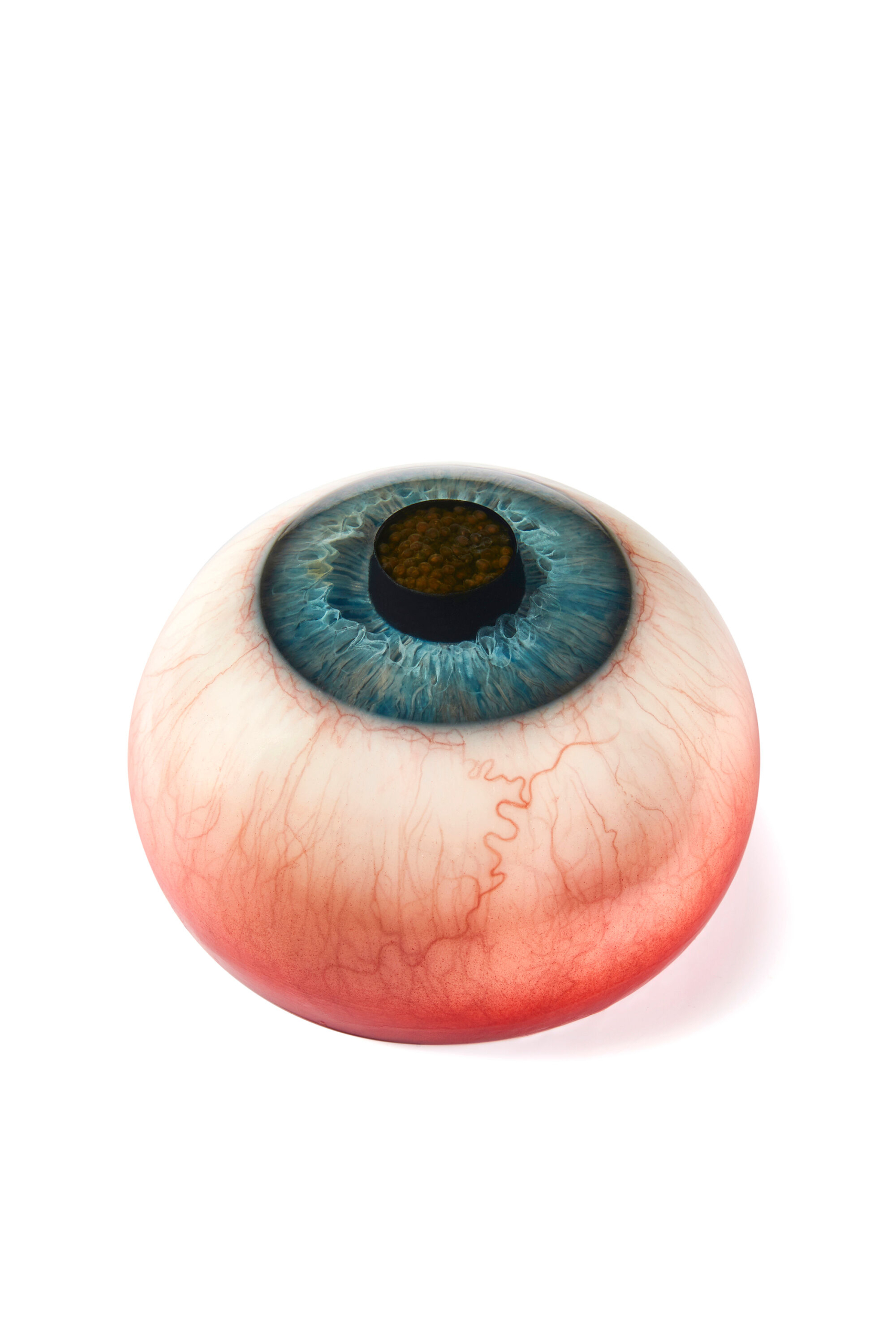
At 22, you became the head chef of the restaurant Treetop in the city of Vejle where you were working. By 32, you were one of the best chefs in the world and co-owner of one of the best restaurants globally. You’ve done it all, if you ask me, what’s next… When will you retire, are you tired, do you feel old, do you feel you have accomplished what you wanted?
(laughter) I definitely feel tired. Wow, has it been ten years already. I don’t feel old (laughter), nor do I feel I’ve achieved everything. Actually, it depends on how you look at it. Even at 22, I felt fulfilled and accomplished. I had the privilege of growing up in a beautiful country where things work very well, predictably well. You’re healthy, you work, you feel fulfilled. Today, after all we’ve achieved with Alchemist, I feel satisfaction and gratitude, of course, and I must tell you that I still have many things on my mind that I want to do and achieve. The restaurant has reached its goals and ambitions for now, but I hope that some of the ideas we want to convey here will continue to live elsewhere, even after we decide to close the doors. The problem is that my ambitions are so large that I wonder if I’ll be able to achieve them all in my lifetime, whether I’ll manage to secure financial support… I always question myself…
So far, everything has been going well for you. You’ve attracted media attention, received financial support for everything Alchemist represents here, and people are curious to find out what you want to tell them. I might not worry if I were in your place. Or?
Everything you say is true, but always before every new task, goal, ambition, event that lies ahead, I feel a bit of anxiety; will everything go well. We’ve opened on Mondays for dinners, and I question whether it might be the last time we’re sold out, whether we’ll continue to manage to sell out dinners in the future. I try not to take things for granted, I feel gratitude for everything we’ve achieved, and I think that at this moment, we have a very important platform for inspiration, for navigating through everything that follows. New chefs are coming, many students learn with us, it’s very interesting to observe. Also, at the same time, a lot is happening, there are many offers for collaborations from all sides, and I’m currently in a phase where I have to carefully choose because I physically can’t be in the restaurant every day and do other things, completely different from what we do here. For instance, I reluctantly had to decline participating in a local potato competition held in a small place where I was invited to the jury for several years. It’s a very local story where people gather around a buffet with food and complain about the juice costing 20 crowns. I’ve always agreed to such events because these are people who have known me since I was 16, but I had to reduce such events due to obligations because I simply don’t have the time.
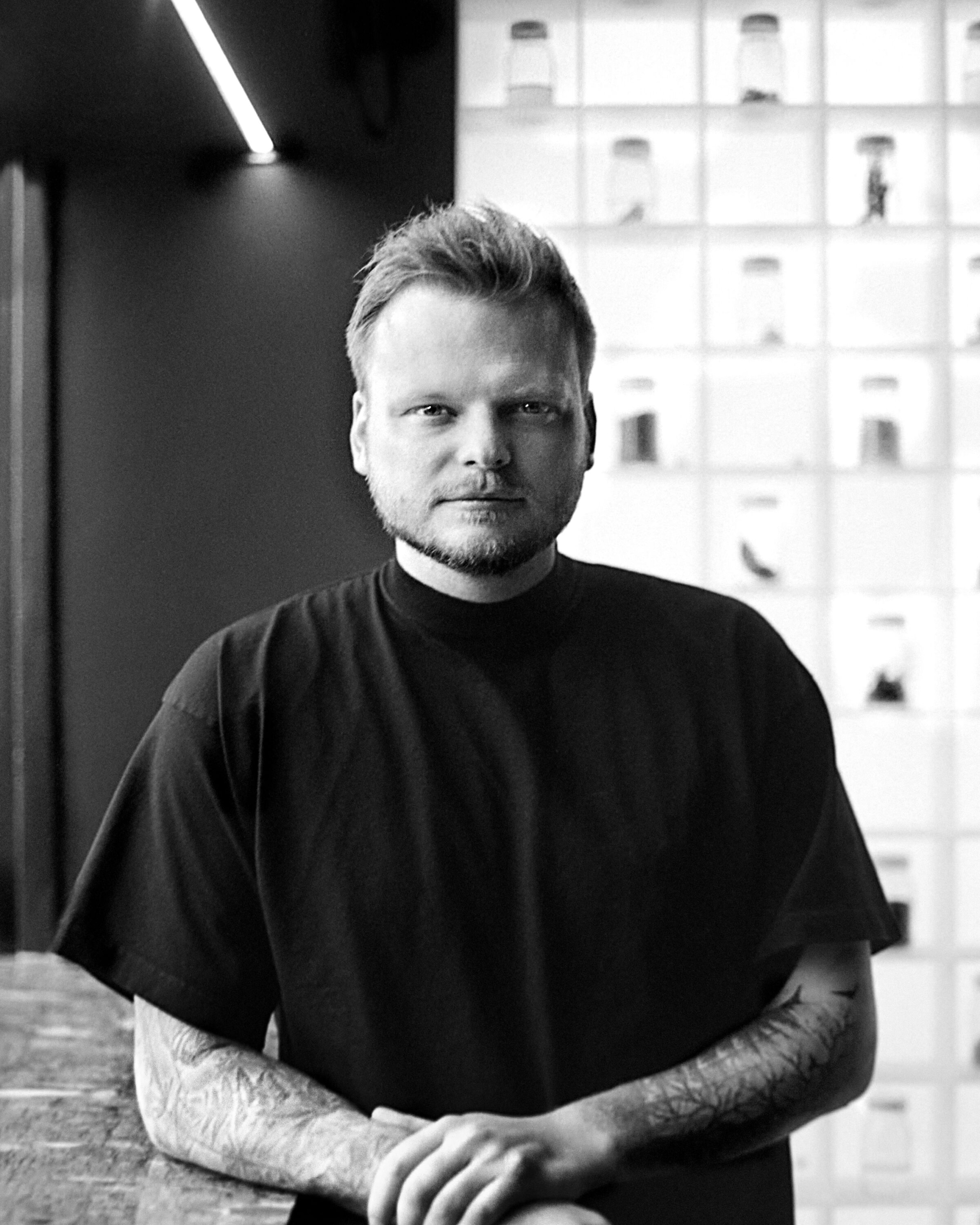
What has Alchemist become since you started it? How has it grown over time…
It has become a big, extensive story, a large engine of ideas and production. We launched the first Alchemist in 2015, and in those early beginnings, I was, so to speak, driving blind, not exactly knowing what I was doing, but knowing it needed to be different from the existing recipes for fine dining. There were four of us in the kitchen and two employees on the floor, in 100 square meters. Today, I have investors, over 100 employees in 8 companies, and 2000 square meters for different visions we’re realizing here. The new Alchemist 2.0, as it’s called, from 2019 to today, has brought numerous changes in the way we work. When we were opening, there were 15 of us working, and after two months, the number of employees grew to 60. There’s a lot of organization, sketching on paper, curating the creation of new visions, and you can always add another layer to everything. Probably, in a few years, I’ll need to draw a line and see where all this leads, what the end is.
Is there an end?
(laughter) Yes, there’s an end even for Alchemist. I don’t know yet where and when, but it will come. Primarily for me, as someone who is constantly here up to 100 hours a week, it will become unsustainable. Also, the question often arises whether fine dining is financially sustainable. We’ve proven that it is, all our employees have good salaries, and we manage to keep the operation going, but the question I more often ask myself is – do I still want to stay in this with this effort and when is actually the time to sign off. The restaurant is now strong, but what’s next. We’ve already stepped into the answer to that question by opening Sporu last year, a laboratory for food molecule research, which will take a few years to play out. And me, when I can no longer be here every day, I will retire.
So far, through Alchemist, you’ve addressed many socially engaged topics. Is there something you still want to talk to the public about, but haven’t yet because the time wasn’t right?
Ufff… there are so many problems in this world, unfortunately. That’s good for our content, but it’s impossible to solve them all. There’s a lot of talk about ecological problems, politicians just utter platitudes, and the world still doesn’t take enough action, it’s crazy. So it seems we have enough to talk about for our entire lives, enough problems to highlight and influence, hoping we’ll find a solution.
(at that moment, he served us a beautiful lab-grown butterfly on the table and connected the conversation to how many people have a problem eating butterflies, but promote insects as a protein-rich food, only in that case, they’ll eat an ant or a grasshopper, but they’ll feel sorry for the butterfly.)
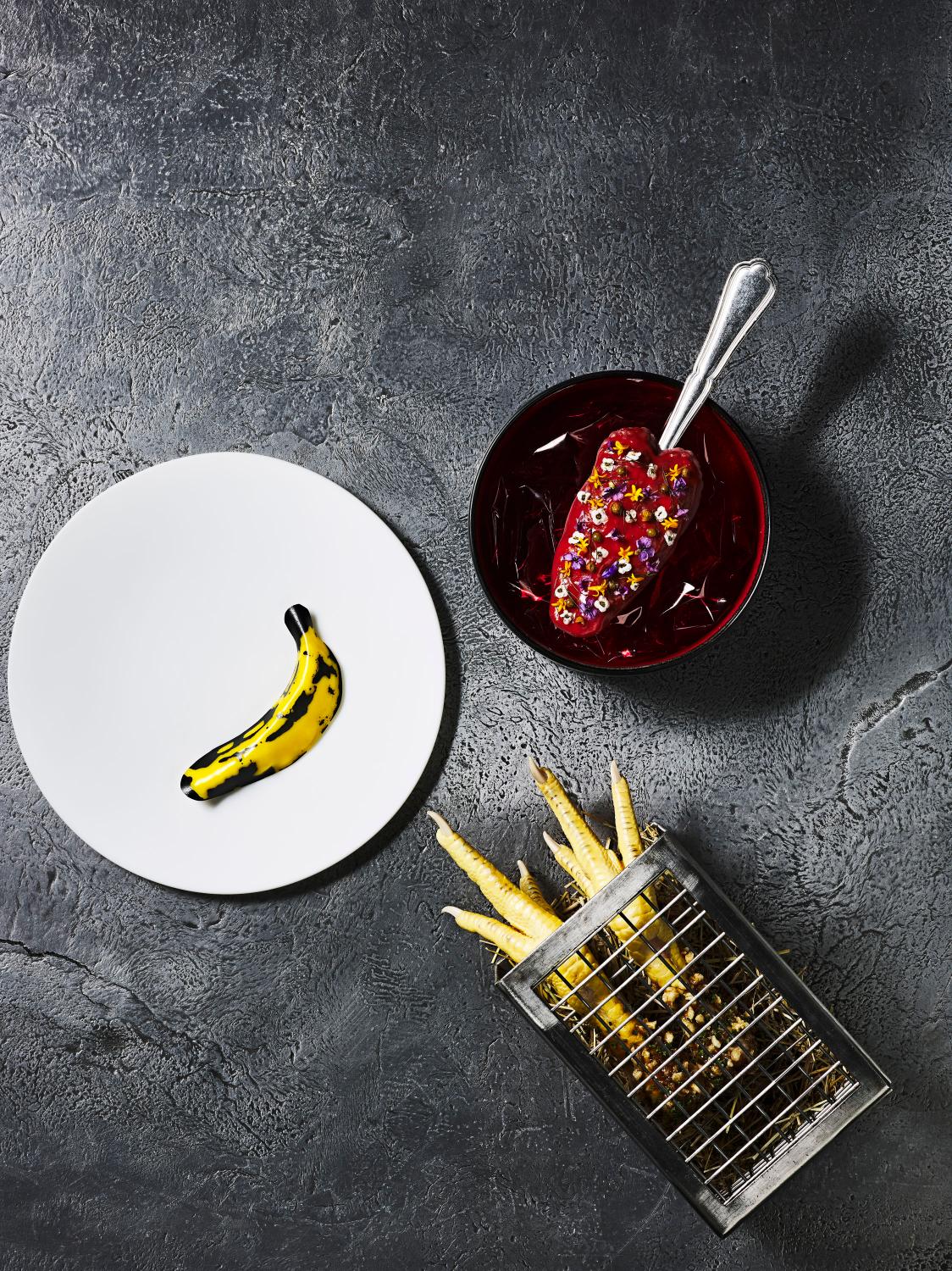
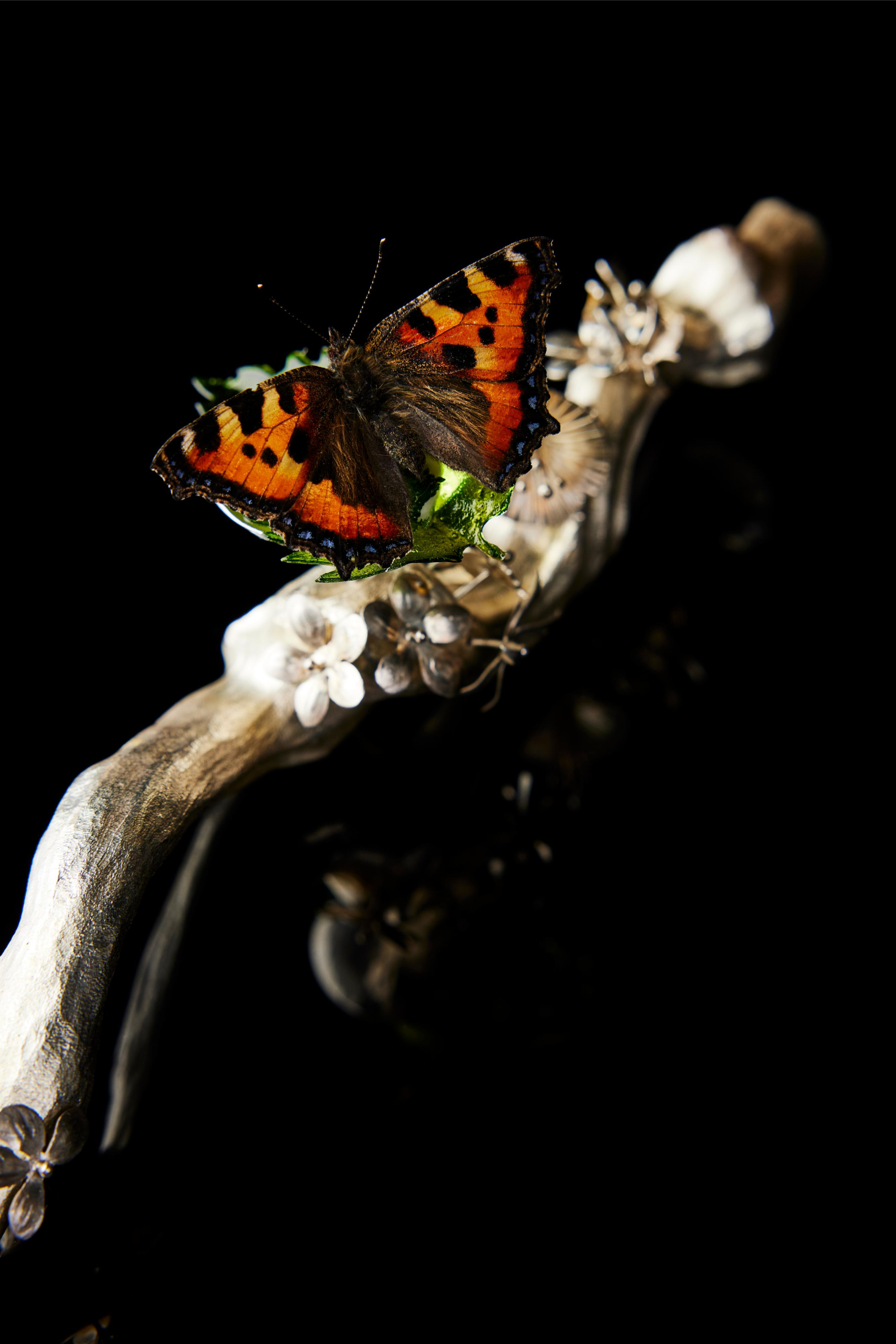
Where does this need to talk about engaged topics come from? What does it bring to you personally?
When I was a young chef at 22, as you said (laughter), I was focused on business, getting stars, on a restaurant that is always filled with guests. At the same time, I was missing a sense of purpose in that, that’s when I started food preparation activities for charitable purposes to fulfill an additional mission for myself (editor’s note: JunkFood is Rasmus’s charitable initiative launched in 2020, in which he would prepare 300 meals a day for the homeless in Copenhagen, active to this day), and others because working hundreds of hours for your own benefit makes no sense. I realized I want to do more of such things with a higher purpose. It doesn’t matter if you leave a mark just around you, in the local community, or on a global level, it’s important that when you look back at the end of your life, you have something to see behind you and whether you’ve spent it on something meaningful. I think Alchemist may have already inspired some chefs to have their own voice, and with Sporu, we want to continue that. We want to continue translating societal problems and use food as a medium, as a way of communication.
Do you enjoy observing the reactions of your guests? Is their feedback important to you?
Feedback is important to me, that’s probably why I like to be here every evening. I like to see where the challenges are, I like to explain to people the food and what we’re actually doing here. When you see Alchemist from the outside, it may not be immediately clear what’s happening, why we serve butterflies and chicken feet in cages, but there’s a lot of messages and meanings behind it.
The whole concept of haute cuisine is serious business, or at least that’s how people perceive it. Do you leave certain moments for yourself that still represent play? Do you still have fun?
First and foremost, it’s a day-to-day job that needs to be done, there are fun and less fun things in a day. There’s a big responsibility behind everything now, many employees, financial sustainability, and although I have an investor, I don’t want to ask him for money every month but try to be sustainable. Especially when you reinvest in new projects because you want things to go further, and we’re not in fine dining for the money, let’s be clear. There’s a lot of stress. There are days when you simply don’t want to be here.
Have you ever wanted to give up?
Oh yes, many times. It’s a humorous nightmare to sometimes ask yourself: why in the world am I doing all this. Then, after that day when you thought to completely give up, you go to a meeting at a children’s hospital and realize you’ve helped them because of activities you’ve worked on for 2 years for them. You turn to the team, and say OK, it does make sense after all. The impact for the better that our activities can have on others feeds me the energy to continue, at least a few more years. (laughter) And I couldn’t do all this without a good team of people, this is all teamwork and very important, and a lot of people are involved in the work. Without them, I couldn’t.
Where did you source some of the most challenging ingredients for your dish, what was that ingredient, and where did it come from?
I think it was the hardest to cultivate butterflies, or at least it took us the longest. And we’ve been studying jellyfish protein with the help of scientists from Harvard in the US, who used the bioluminescence of this jellyfish protein for medical purposes for the human body, and we wanted to translate that into our dictionary, we’ve been working on it for about 6 years, starting in the old Alchemist. Those were our two hardest ingredients to obtain.
Where do you source parts of animals that are thrown away or discarded?
From local sellers, and they will charge me enormous amounts of money for those parts, which they would otherwise get rid of, it’s crazy (laughter). The problem is that the meat processing industry and parts of animals are not used to exploiting unusual parts. We’re trying to change that perception and introduce more sustainable practices so that every part can be used and nothing has to be thrown away. It’s a pity we didn’t continue the tradition of old recipes when all parts of the meat were used. We failed to translate that into modern language so new generations don’t quite understand it. Today, the system is focused on growth, financial gain, on one’s own income without considering sustainable practices. Farmers today have to adapt to these flows, and we’re not allowed to ask what the future of it all is. We need to do much more for the future.
What are you currently working on?
Currently, I’m developing a bit more conceptual story – what a restaurant on the Moon would look like. Our team is working with a researcher from MIT and NASA’s food lab on designing meals for space travel. The research includes new techniques for obtaining food, more specifically space bread. We’ve managed to create an airy texture from soy through aeration, i.e., injecting air into the product, on which we serve caviar, this texture immediately dissolves in the mouth, and the caviar is very pronounced, just like a substitute for bread. By 2025, we’ll prepare a space menu and send it to space, we’ll serve it in a capsule. Unfortunately, we won’t be able to send it to the Moon, but a little closer, to the edge of the atmosphere.
What is the future of gastronomy from your perspective?
The future of gastronomy is, I hope, as diverse as the scene actually is today. With Alchemist and Sporu, we plan to continue studying techniques for obtaining certain products. We want to partner with companies and work with them on obtaining better, higher quality products that will encourage more sustainable practices. For example, obtaining proteins, sugars, and other ingredients through non-commercial streams. Butterfly protein in the supermarket would never pass in its original form, but it can be turned into powder, provided that the entire cultivation and processing process is sustainable. The view of food from Alchemist, we want to transfer to Sporu. We’ll try to encourage commercial production of certain ingredients, but still research in the lab what’s possible. If you ask me what the future of fine dining is, I hope it’s more like Alchemist. I believe it should be more personal, should tell us more stories, like storytelling if people want to buy experiences. It should be more than just food. I think it’s important to think beyond just ingredients and consuming food.
And finally, what do you prepare at home for dinner?
(laughter) I rarely cook, I’m rarely at home. I’m a chef who doesn’t cook at home. (laughter) So far, I’ve made only two meals in my apartment, and both were for New Year’s. My girlfriend actually cooks at home and she’s quite a decent cook, I must say. (laughter)